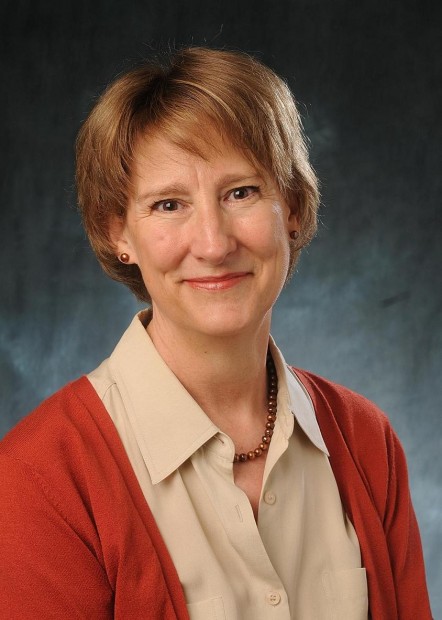
Barbara Bintliff, director of the Tarlton Law Library and Jamail Center for Legal Research and Joseph C. Hutcheson Professor in Law
Some areas of the law evolve faster than others, while some barely change at all. Then there is the law library, that cornerstone of the legal world, which has perhaps seen the most rapid change of all as it moves into the digital era. Printed legal references still play their essential role, but more and more resources are available electronically, posing new challenges for those responsible for making sense of it all.
Barbara Bintliff, the new director of the Tarlton Law Library and Jamail Center for Legal Research and Joseph C. Hutcheson Professor in Law, plans to keep the law library in the vanguard of institutions meeting those challenges.
“The Tarlton Law Library has long been a leader and innovator—the law library that people look to when they want to see what’s new,” Bintliff said. “One of my goals is to make sure we continue to hold that place of prominence. That means we need to continue to develop innovative student services, offer the strongest faculty services possible, take the lead in establishing the most effective balance between electronic and print resource instruction, and develop the excellent information resource collections in a way that will anticipate and respond to faculty and student needs.”
Bintliff will join the University of Texas School of Law next fall. She comes to the Law School from the University of Colorado at Boulder, where she has been the law library director since 1989. She received that university’s highest recognition, the Robert L. Stearns Award, in 2008 for extraordinary achievements in teaching, research, and service. She is an active member of the American Law Institute, the nation’s leading scholarly organization dedicated to improving the law; the American Bar Association; and the Association of American Law Schools.
She earned a Master of Law Librarianship from the University of Washington, a Juris Doctor from the University of Washington School of Law, and a Bachelor of Arts from Central Washington State College with highest honors.
A former president of the American Association of Law Libraries who also served as president of the Southwestern Association of Law Libraries and Colorado Association of Law Libraries, she brings an impressive history of law librarian leadership to the Tarlton Law Library.
“I am delighted that Barbara Bintliff has accepted our offer,” said Law School Dean Lawrence Sager. “Roy Mersky left the University of Texas School of Law an extraordinary legacy: one of the finest law libraries in world—a great center of scholarship and training. Our library is now at a pivotal point in its history, and there are few appointments more important to the Law School than that of Roy’s successor. Barbara Bintliff is a seasoned library director and a visionary, and the prospects for the Tarlton Law Library could not be brighter.”
“Barbara Bintliff is well-known in the library profession,” said Professor Terry Martin, who has served as the interim director of the Tarlton Law Library and was a member of the search committee. “At the University of Colorado she chaired both the Faculty Assembly and the Athletic Board, so she is a proven administrator. She is also a productive scholar, with a long list of contributions as an author, editor, and speaker. Roy Mersky had a national reputation as a developer of law librarians and we wanted to maintain that tradition, both informally and formally, as part of the new dual degree program between the Law School and the School of Information. Barbara Bintliff, too, is known as a mentor of younger law librarians.”
Bintliff’s research interests include examining the differences between using print and electronic media for legal research, and in particular understanding how different research methods can produce divergent results. There are differences in what information is retrieved when researching the same problem in print and electronic sources and even differences when searching the same electronic database, based on how the search is performed.
“We have always taught legal research as if the law was an identifiable set of rules, doctrines and applications that you could research and understand,” Bintliff said. “If you were involved in a legal dispute, your attorney and the other party’s attorney would find and use essentially the same law when using print resources. But there is so much information today—in so many formats and in so many places—that attorneys may not be looking in the same places and finding the same law.
“One of my concerns is that we are losing a sense of coherency in the law because there are so many places and so many ways to do legal research,” she added. “We need to develop new tools and processes that are not tied to the print world alone and that will reestablish a common starting place for research.”
As director of the Tarlton Law Library, Bintliff looks forward to helping law students successfully navigate this increasingly complex network of legal information.
“Every attorney needs to be able to do legal research,” she said. “As law librarians, our challenge is teaching our students efficient, ethical, and cost-effective legal research.”
While the administrative and academic duties of her new position will certainly keep her busy, Bintliff will continue to pursue her professional interest in advancing legal research education more broadly.
“We really need a new national movement to better define legal research education and develop legal information literacy standards,” Bintliff said. “Legal research is a fundamental skill, but its whole landscape has shifted. We no longer have those very clear steps on how to research a specific issue. We now have to figure out the correct approaches in this new print and digital world. The Tarlton Law Library, with its outstanding reputation and highly qualified personnel, is the right place to begin that movement.”
